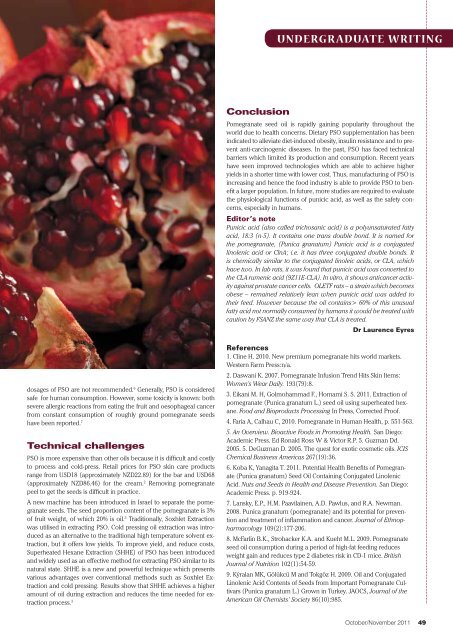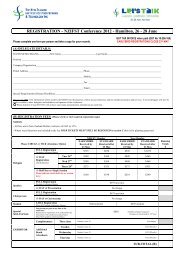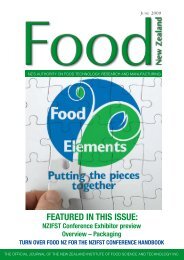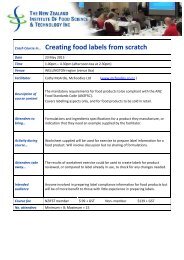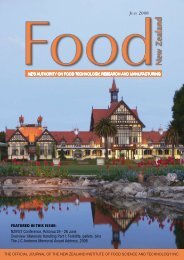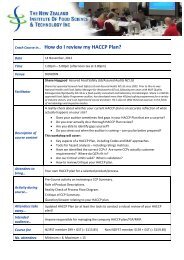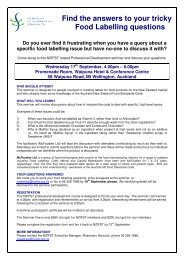featured in this issue - NZIFST - The New Zealand Institute of Food ...
featured in this issue - NZIFST - The New Zealand Institute of Food ...
featured in this issue - NZIFST - The New Zealand Institute of Food ...
Create successful ePaper yourself
Turn your PDF publications into a flip-book with our unique Google optimized e-Paper software.
UNDERGRADUATE WRITING<br />
Conclusion<br />
Pomegranate seed oil is rapidly ga<strong>in</strong><strong>in</strong>g popularity throughout the<br />
world due to health concerns. Dietary PSO supplementation has been<br />
<strong>in</strong>dicated to alleviate diet-<strong>in</strong>duced obesity, <strong>in</strong>sul<strong>in</strong> resistance and to prevent<br />
anti-carc<strong>in</strong>ogenic diseases. In the past, PSO has faced technical<br />
barriers which limited its production and consumption. Recent years<br />
have seen improved technologies which are able to achieve higher<br />
yields <strong>in</strong> a shorter time with lower cost. Thus, manufactur<strong>in</strong>g <strong>of</strong> PSO is<br />
<strong>in</strong>creas<strong>in</strong>g and hence the food <strong>in</strong>dustry is able to provide PSO to benefit<br />
a larger population. In future, more studies are required to evaluate<br />
the physiological functions <strong>of</strong> punicic acid, as well as the safety concerns,<br />
especially <strong>in</strong> humans.<br />
Editor’s note<br />
Punicic acid (also called trichosanic acid) is a polyunsaturated fatty<br />
acid, 18:3 (n-5). It conta<strong>in</strong>s one trans double bond. It is named for<br />
the pomegranate, (Punica granatum) Punicic acid is a conjugated<br />
l<strong>in</strong>olenic acid or ClnA; i.e. it has three conjugated double bonds. It<br />
is chemically similar to the conjugated l<strong>in</strong>oleic acids, or CLA, which<br />
have two. In lab rats, it was found that punicic acid was converted to<br />
the CLA rumenic acid (9Z11E-CLA). In vitro, it shows anticancer activity<br />
aga<strong>in</strong>st prostate cancer cells. OLETF rats – a stra<strong>in</strong> which becomes<br />
obese – rema<strong>in</strong>ed relatively lean when punicic acid was added to<br />
their feed. However because the oil conta<strong>in</strong>s> 60% <strong>of</strong> <strong>this</strong> unusual<br />
fatty acid not normally consumed by humans it would be treated with<br />
caution by FSANZ the same way that CLA is treated.<br />
Dr Laurence Eyres<br />
dosages <strong>of</strong> PSO are not recommended. 6 Generally, PSO is considered<br />
safe for human consumption. However, some toxicity is known: both<br />
severe allergic reactions from eat<strong>in</strong>g the fruit and oesophageal cancer<br />
from constant consumption <strong>of</strong> roughly ground pomegranate seeds<br />
have been reported. 7<br />
Technical challenges<br />
PSO is more expensive than other oils because it is difficult and costly<br />
to process and cold-press. Retail prices for PSO sk<strong>in</strong> care products<br />
range from USD18 (approximately NZD22.89) for the bar and USD68<br />
(approximately NZD86.46) for the cream. 2 Remov<strong>in</strong>g pomegranate<br />
peel to get the seeds is difficult <strong>in</strong> practice.<br />
A new mach<strong>in</strong>e has been <strong>in</strong>troduced <strong>in</strong> Israel to separate the pomegranate<br />
seeds. <strong>The</strong> seed proportion content <strong>of</strong> the pomegranate is 3%<br />
<strong>of</strong> fruit weight, <strong>of</strong> which 20% is oil. 3 Traditionally, Soxhlet Extraction<br />
was utilised <strong>in</strong> extract<strong>in</strong>g PSO. Cold press<strong>in</strong>g oil extraction was <strong>in</strong>troduced<br />
as an alternative to the traditional high temperature solvent extraction,<br />
but it <strong>of</strong>fers low yields. To improve yield, and reduce costs,<br />
Superheated Hexane Extraction (SHHE) <strong>of</strong> PSO has been <strong>in</strong>troduced<br />
and widely used as an effective method for extract<strong>in</strong>g PSO similar to its<br />
natural state. SHHE is a new and powerful technique which presents<br />
various advantages over conventional methods such as Soxhlet Extraction<br />
and cold press<strong>in</strong>g. Results show that SHHE achieves a higher<br />
amount <strong>of</strong> oil dur<strong>in</strong>g extraction and reduces the time needed for extraction<br />
process. 3<br />
References<br />
1. Cl<strong>in</strong>e H. 2010. <strong>New</strong> premium pomegranate hits world markets.<br />
Western Farm Press:n/a.<br />
2. Daswani K. 2007. Pomegranate Infusion Trend Hits Sk<strong>in</strong> Items:<br />
Women’s Wear Daily. 193(79):8.<br />
3. Eikani M. H, Golmohammad F., Homami S. S. 2011. Extraction <strong>of</strong><br />
pomegranate (Punica granatum L.) seed oil us<strong>in</strong>g superheated hexane.<br />
<strong>Food</strong> and Bioproducts Process<strong>in</strong>g In Press, Corrected Pro<strong>of</strong>.<br />
4. Faria A, Calhau C, 2010. Pomegranate <strong>in</strong> Human Health, p. 551-563.<br />
5. An Overview. Bioactive <strong>Food</strong>s <strong>in</strong> Promot<strong>in</strong>g Health. San Diego:<br />
Academic Press. Ed Ronald Ross W & Victor R.P. 5. Guzman Dd.<br />
2005. 5. DeGuzman D. 2005. <strong>The</strong> quest for exotic cosmetic oils. ICIS<br />
Chemical Bus<strong>in</strong>ess Americas 267(19):36.<br />
6. Koba K, Yanagita T. 2011. Potential Health Benefits <strong>of</strong> Pomegranate<br />
(Punica granatum) Seed Oil Conta<strong>in</strong><strong>in</strong>g Conjugated L<strong>in</strong>olenic<br />
Acid. Nuts and Seeds <strong>in</strong> Health and Disease Prevention. San Diego:<br />
Academic Press. p. 919-924.<br />
7. Lansky, E.P., H.M. Paavila<strong>in</strong>en, A.D. Pawlus, and R.A. <strong>New</strong>man.<br />
2008. Punica granatum (pomegranate) and its potential for prevention<br />
and treatment <strong>of</strong> <strong>in</strong>flammation and cancer. Journal <strong>of</strong> Ethnopharmacology<br />
109(2):177-206.<br />
8. McFarl<strong>in</strong> B.K., Strohacker K.A. and Kueht M.L. 2009. Pomegranate<br />
seed oil consumption dur<strong>in</strong>g a period <strong>of</strong> high-fat feed<strong>in</strong>g reduces<br />
weight ga<strong>in</strong> and reduces type 2 diabetes risk <strong>in</strong> CD-1 mice. British<br />
Journal <strong>of</strong> Nutrition 102(1):54-59.<br />
9. Kýralan MK, Gölükcü M and Tokgöz H. 2009. Oil and Conjugated<br />
L<strong>in</strong>olenic Acid Contents <strong>of</strong> Seeds from Important Pomegranate Cultivars<br />
(Punica granatum L.) Grown <strong>in</strong> Turkey. JAOCS, Journal <strong>of</strong> the<br />
American Oil Chemists’ Society 86(10):985.<br />
October/November 2011 49


